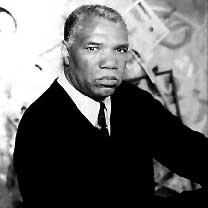Major Works
- Home/Bass: Poems 2013
- Velvet Bebop Kente Cloth (2003)
- Paul Robeson (1998) (a children’s book), Adjoa J. Burrowes (Illustrator)
- Ornate With Smoke (1997)
- Hornman (1996)
- Harriet Tubman (1996) Adjoa J. Burrowes (Illustrator)
- Johannesburg and Other Poems (1993)
- Blues Narratives 1999
- Blues: The Story Always Untold (1989)
- Mojo Hands Call, I Must Go (1982)
- Somehow We Survive: An Anthology of South African Writing (1982)
- Steps to Break the Circle (1974)
- Muslim Men (1971)
- Black Rituals (1972)
- Half Black, Half Blacker (1970)
- Portable Soul (1969)
- Development Arrested: Race, Power and the Blues in the Mississippi Delta by Clyde Woods, Sterling Plumpp (Contributor)
Sterling Plumpp: A Biography
by Tarvis Williams (SHS) 1997
Sterling Plumpp was born in Clinton, Mississippi, on January 30, 1940. He was reared by his maternal grandparents, Mattie and Victor Emmanuel. They were sharecroppers, and Plumpp and his brother worked the fields with their grandparents (“The Characters” 1). He and his family lived about ten miles from school, and there were no buses for them to ride. Therefore, they did not start school until they were eight or nine years old, when they were able to walk the distance. As a young boy, Plumpp never attended school a full year (Black Rituals 107-8).
At the age of fifteen, he moved to Jackson, Mississippi, where he completed grammar and high school (Black Rituals 108). Plumpp graduated as class valedictorian in 1960 (“The Characters” 2). Later, he spent two horrible years at St. Benedict’s College. He quit school and joined the Army, where he spent two learning years. When he went to Chicago in the fall of 1962, he got a job in the main post office at Canal and Van Buren just east of the University of Illinois campus.
Today Plumpp is a professor of English and African-American Studies at the University of Illinois at Chicago. He has won two Amoco-Silver Circle Awards for excellence in teaching. This award is selected by the graduating seniors. He also won the Carl Sandburg Literary Prize for poetry for his writing of “The Mojo Hands Call, I Must Go” in 1983 (Plumpp). He was an adviser for the television production of The Promised Land.
He has written numerous books, including Hornman, Harriet Tubman, Ornate With Smoke, Blues: The Story Always Untold, Half Black, Half Blacker. When Black Rituals was printed in December 1987, Plumpp was writing Superbad and the Hip Jesus, which is about black people and the way they live (Black Rituals 108). Plumpp does poetry workshops in addition to his teaching at the University of Illinois at Chicago. His book Steps To Break the Circle is about his life in Clinton, Mississippi in the 1940’s and early 50’s.
Plumpp, a $1 million winner in the Illinois Lottery and who taught at University of Illinois at Chicago since 1971, retired with emeritus status in December of 2001. He plans to travel to South Africa and Mississippi to gather research material for current and future writing projects before resuming teaching part-time. Plumpp looks forward to having more time to devote to writing and supporting and nurturing the talents of young African-American writers.
An Analysis of the poem Underclass
by Tarvis Williams (SHS)
“Underclass” is a poem about slaves and how the free people lived up north. The poem states, “The men’s minds read letters from dreams they chased up north” (lines 1-5). This line means that slaves received letters from friends or relatives who lived in northern states, and they thought of the conditions as a dream situation. The slaves up north were living the type of life that slaves dreamed about living someday.
Another line, “Work, git paid every Friday” (lines 10-11), says that the slaves were surprised to know that workers up north got paid for working since they worked for free. Other lines say, “Up north, got lights, toilets inside and you talk back and fight back when somebody mess with you” (lines 15-19), showing that the slaves in the south were clearly living as underclass people when compared to blacks living in the northern states. In the houses of the free slaves up north, there were lights and inside bathrooms, but the slaves in the south did not enjoy such good living conditions. Second, the people up north can not take advantage of you without your doing something about it. Another line, “Work here if you are willing to work” (lines 20-21), shows that blacks were not forced to work up north. “Folks is just folks. That color stuff don’t exist” (lines 30-33) says that white, black, and others are all the same. None of the races are treated differently in the north.
This poem tells much about the slavery days, and how hard slaves’ living conditions were at the time. I think all people, not just black, should read this poem. Poems like “Underclass” should not produce hatred between races, but a sense of love for each other since both blacks and whites have worked together to produce a better Mississippi for us to live in. Poems like this one should also serve as a motivation to young people today. I have heard older individuals say that, “A man without knowledge of his past is doomed to repeat it.” If we as young people fail to get a good quality education today, we can find ourselves living in similar conditions. There are many homeless people today who are without lights and inside bathrooms. They have not managed to keep up with the changes in society because of a lack of education and motivation.
A Telephone Interview with Sterling Plumpp – November, 1997
by Tarvis Williams (SHS)
Tarvis Williams: “What are your parents’ and grandparents’ names?”
Sterling Plumpp: ” My father’s name was Cyrus H. Plumpp. He was born in 1940 and died in 1965. My mother’s name was Mary Emmanuel. She was born August 16,1920, and died April, 1980. Victor Emmanuel was was my grandfather. He was born January 26, 1880, and died January 8, 1955. I lived with my aunt Carrie Jefferson during my last two years of high school.”
Tarvis Williams: “Is the book Black Rituals a true story?”
Sterling Plumpp: “Yes, Black Rituals is a true story.”
Tarvis Williams: “Who is your favorite author?”
Sterling Plumpp: “James Baldwin and Richard Wright of Natchez, Mississippi, are my favorite authors.”
Tarvis Williams: “Which author has influenced you the most?”
Sterling Plumpp: “Baldwin influenced me as a black writer, but Wright helped me understand how to deal with the prejudices in Mississippi and how to write about it.”
Tarvis Williams: “When did you become interested in writing?”
Sterling Plumpp: “I attended Holy Ghost High School in Jackson, Mississippi, in 1958. I quit college when I was twenty-two years old and made up my mind then to be a writer.”
Tarvis Williams: “What kind of student were you in high school?”
Sterling Plumpp: “I was the valedictorian of my class.”
Tarvis Williams: “How long did it take you to write Black Rituals?”
Sterling Plumpp: “It took me two years to write Black Rituals. I started writing it at the age of thirty.”
Tarvis Williams: “Are you working on a new book now?”
Sterling Plumpp: “I am working on Steps to Break the Circle. This book is about my life in Clinton, Mississippi.”
Tarvis Williams: “Have you received any awards?”
Sterling Plumpp: “Yes, I received the ‘Carl Sandburg Literary Prize’ for poetry for writing the poem ‘The Mojo Hands Call, I Must Go’ in 1983.”
Tarvis Williams: “Do you have any advice for future writers?”
Sterling Plumpp: “The key thing is to read a lot of history and go to college at least four years.”
Tarvis Williams: “Is your name a pen name?”
Sterling Plumpp: “No.”
Tarvis Williams: “How has living in Mississippi influenced your writing?”
Sterling Plumpp: “Mississippi helped me in two ways. One way was by showing me how to have a strong family. Another way it helped was that it showed me how to believe in God despite the hatred and racism.”
Related Websites
- Poetry Foundation’s biography of Plumpp
- Reviews on Amazon.com give list of poem found in Blues: The Story Untold
- Review of Blues Narratives, which are the first portions to be published of his ongoing work in progress, MFUA’S SONG. They are a poetic form and a dialogue between poet and subject, unlike anything else in American poetry: a vital, passionate, haunting poetry meant to be read and spoken and sung.
- Plumpp quoted at death of poet Gwendolyn Brooks
- Encyclopedia of Southern Culture lists Plumpp.
- University of Illinois at Chicago English and African-American studies professor Sterling Plumpp won $1 million in the Illinois lottery’s Vegas Instant Game on Aug. 13, 2001.
- The University of Illinois at Chicago will host a symposium celebrating the distinguished career of Sterling Plumpp, professor of English and African-American studies.
Bibliography
- Plumpp, Sterling D. Black Rituals. Chicago: Third World Press, 1972.
- Plumpp, Sterling D. Black Rituals. “Biography” .107-108. Chicago Third World Press, 1972.
- Plumpp, Sterling D. “Underclass”
- Williams “The Characters” from The Promised Land


